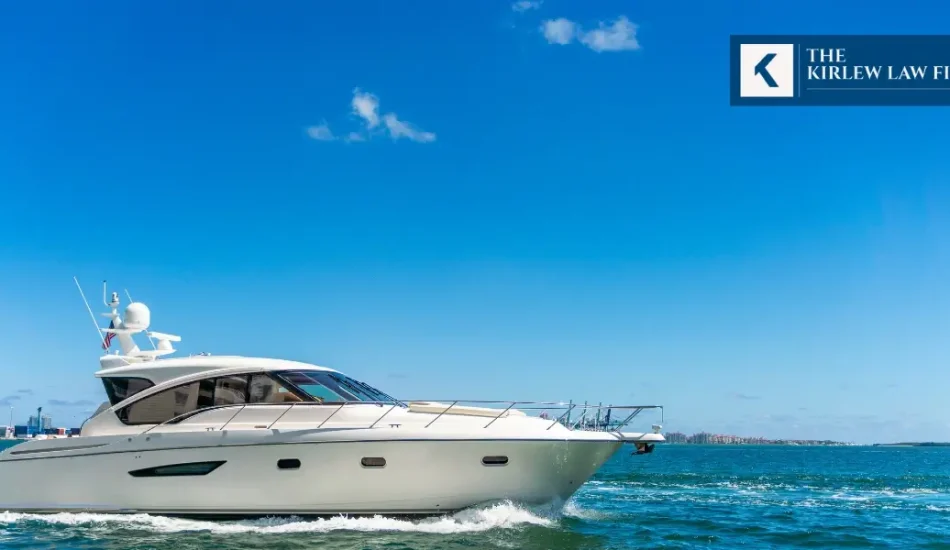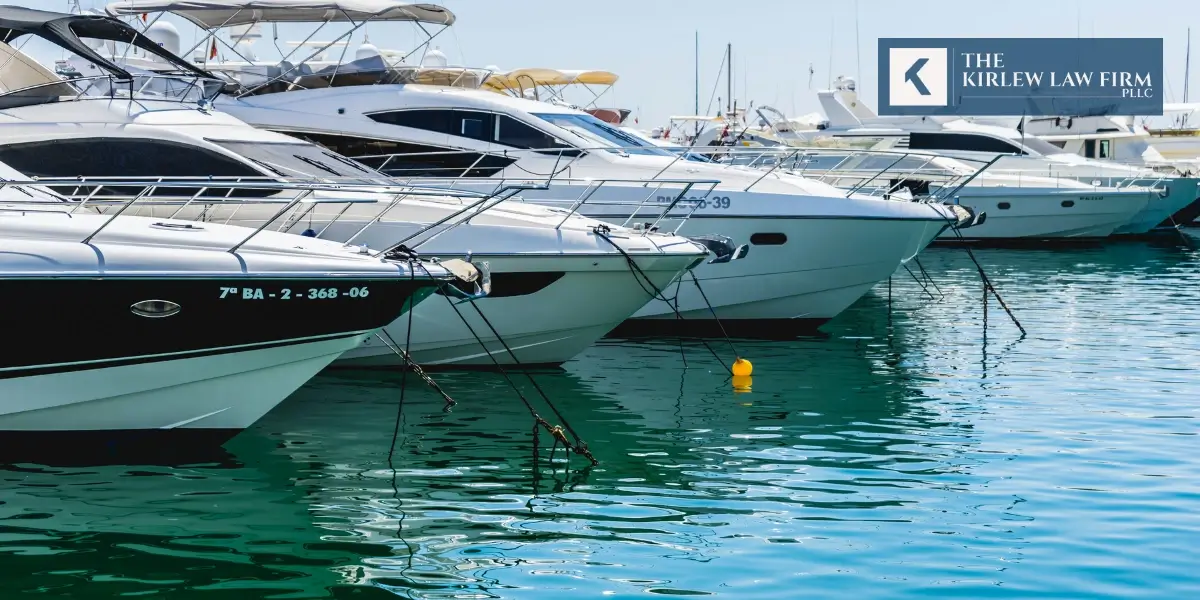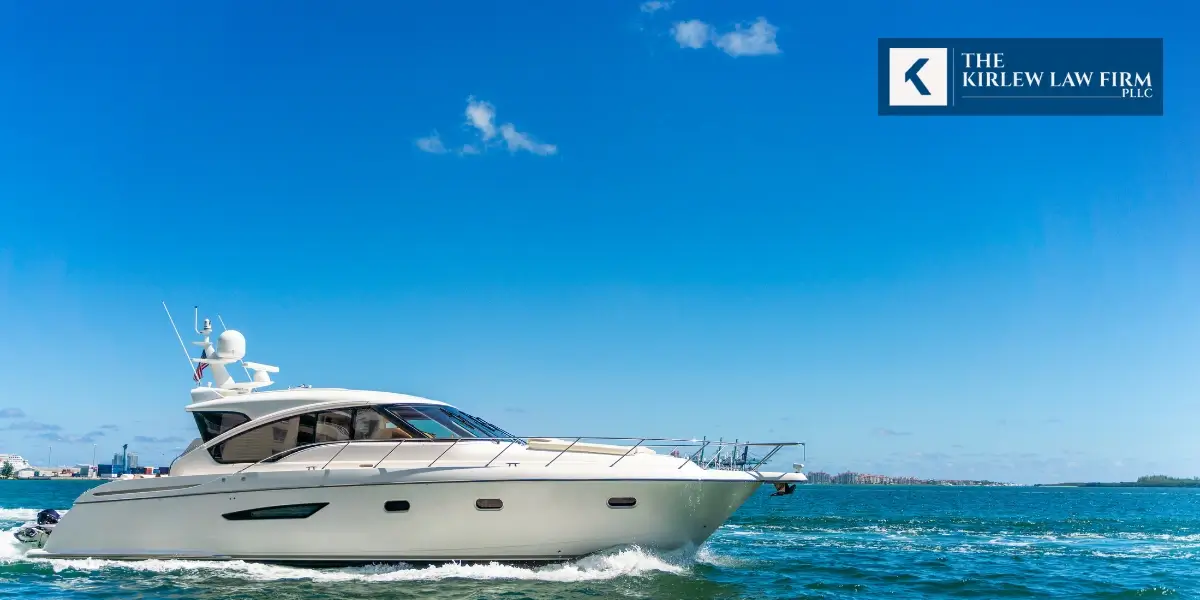|
|
Last
Modified on
Aug 13, 2025
With access to both the Atlantic Ocean and the Gulf of Mexico, including myriad rivers, lakes, and waterways, boating is a way of life for many Floridians. But for this hobby to be enjoyed safely, it’s important for boaters to understand boating crimes in Florida and how these laws work.
Common Types of Boating Crimes in Florida
Boating crimes include any unlawful act committed while operating a watercraft. These offenses range from operating under the influence to fleeing the scene of an accident. Convictions come with serious consequences under Florida boating crime laws.
Some of the most common types of boating crimes in Florida include:
- Boating under the influence (BUI). This offense occurs when a person operates a vessel while impaired by alcohol or drugs. Florida law prohibits operating a boat with a blood alcohol concentration above the legal limit. This law applies to all boats, jet skis, and other personal watercraft. A conviction can lead to criminal charges, mandatory boating safety courses, and probation. Alcohol and drugs contributed to 23% of boating fatalities in 2022.
- Reckless or careless operation of a vessel. Reckless or careless operation involves driving a boat in a manner that endangers others or property. This can include speeding in no-wake zones, performing dangerous stunts, or weaving through crowded areas at high speeds. If the reckless behavior results in injury or death, felony charges may apply. In 2024, 112 people died when their boat collided with another boat or a fixed object.
- Leaving the scene of a boating accident. Boaters involved in an accident that causes damage, injury, or death are legally obligated to stop, provide aid, and report the incident to the proper authorities. Fleeing the scene can result in felony charges, especially if someone was seriously hurt or killed.
- Boating without proper safety equipment or licensing. While typically considered regulatory violations, repeated or intentional failure to comply with safety and registration requirements can rise to the level of a boating crime case. Minors and those with prior boating-related offenses may be subject to stricter licensing and training requirements. Violations can result in fines, probation, or even criminal charges under various circumstances.
- Environmental and wildlife violations. Florida’s ecosystems are closely protected under state and federal law. Boaters who violate environmental rules, such as anchoring in protected seagrass, dumping waste, or harassing marine wildlife, may face criminal prosecution.

Boating Crime Laws and Enforcement
Florida boating crime laws are enforced by agencies such as the Florida Fish and Wildlife Conservation Commission, local law enforcement, and the U.S. Coast Guard. These authorities are granted the power to stop vessels, inspect for compliance, and make arrests.
The Boater Freedom Act has changed how and when officers can conduct certain types of stops, however. They need reasonable suspicion of a crime to stop a boat, or they need a first-hand witness to unsafe behavior.
Consequences of a Boating Crime Conviction in Florida
The severity of the consequences of a boating crime conviction depends on the nature of the offense, your prior history, and whether anyone was harmed. Penalties can include paying significant fines, jail or prison time, probation or community service, substance abuse treatment, and a permanent criminal record.
You may lose your right to operate a boat in Florida. Offenders are often required to complete boating safety courses after a conviction, as well. If others were harmed, you might be held financially responsible in civil court, even if you resolve the criminal charges aspect of the case.
Why You Should Work With The Kirlew Law Firm, PLLC
When you’re facing a boating crime charge in Florida, you need a knowledgeable attorney on your side to help you navigate the legal complexities. The Kirlew Law Firm, PLLC, represents individuals throughout the state facing serious boating-related charges. We know how prosecutors work and bring a strategic approach to defending every case.
Our team holds extensive experience handling a wide range of criminal cases, including high-stakes boating crime cases. We treat every client with the personalized attention they deserve and keep you informed and involved throughout the legal process.

FAQs
Q: Is a BUI as Bad as a DUI in Florida?
A: Yes, boating under the influence, or BUI, is just as serious as a driving under the influence charge in Florida. Penalties include jail time, community service, fines, and mandatory substance abuse treatment. If the BUI results in injury or death, felony charges will likely apply. These come with even harsher penalties. A BUI won’t affect your driver’s license the way a DUI would, but you will still have a permanent criminal record and revoked boating privileges.
Q: What Is the Leading Cause of Death in Florida Boating?
A: The leading cause of death in Florida boating accidents is drowning, usually because the person is not wearing a life jacket. Alcohol use, operator inattention, excessive speed, and inexperience are also major contributing factors.
The Florida Fish and Wildlife Conservation Commission reports that many fatalities could be prevented with proper safety measures. This includes operating the boat sober and using personal floatation devices. Overall, boating accidents claim more than 800 lives per year.
Q: What Is the New Boat Law in Florida?
A: Florida’s new Boater Freedom Act, recently signed by Governor Ron DeSantis, restricts when law enforcement officers can stop and inspect vessels. Under this law, authorities need reasonable suspicion or probable cause to conduct a safety or sanitation check. It also reclassifies infractions related to boating safety gear and marine sanitation systems as secondary offenses.
Q: What Happens if You Are Found Guilty of Violating a Boating Law in Florida?
A: If you’re found guilty of violating a Florida boating law, the consequences vary depending on the offense. Serious offenses, like a BUI, causing injury to another, or reckless operation, can lead to jail time, probation, vessel impoundment, and the loss of your boating privileges, while minor violations may only result in boating safety course requirements or fines.
Hire a Boating Crime Lawyer
If you find yourself under investigation for a boating-related charge, contact The Kirlew Law Firm, PLLC, today to schedule a consultation. Let us help protect your rights and get you back into the water. Hire a boating crime lawyer today.






